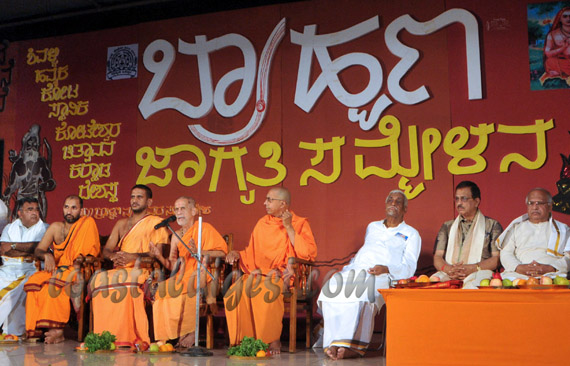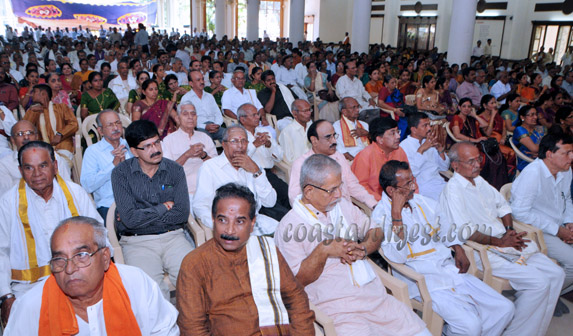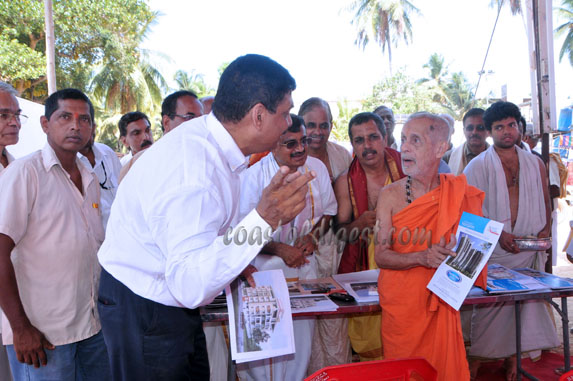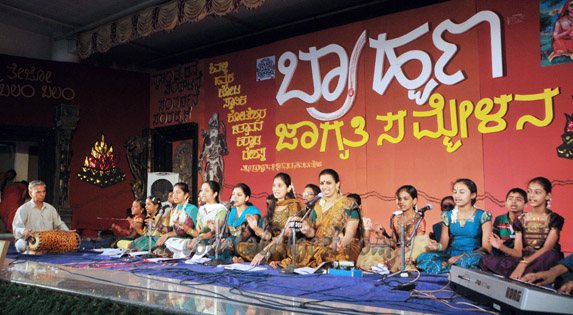Speaking at 'Brahmana Jagrathi Sammelana' programme organized by the Brahmana Federation, Mangalore, at 'Sanghaniketana' in the city on Sunday the seer claimed that he has evidence to justify that the practice existed in the society in South India even before Brahmins came into the picture.
“Some so called intellectuals are attributing all evils in the society to Brahmins. Untouchability is not a contribution of Brahmins. I can prove that caste system existed in South India much before,” he asserted terming the present reservation system as a 'challenge'. “It is unfortunate that talented Brahmins are losing out on opportunities because of reservation,” he said.
'We are one'
Stating that although Brahmins are divided into several groups in coastal districts such as Shivalli, Havyaka, Kota, Sthanika, Koteshwara, Chitpavan, Deshastha and so on, he maintained that Brahmins are all one.
“We are all the sons of 'Vedamaathe'. The different philosophies like the Dwaitha, Advaitha, Vishistadvaitha are like branches of a tree. The Vedic Dharma is the root and we all need to water the roots, not the branches. Fingers come together and form a fist. A fist can either be used to knock someone down or hold something firmly. Brahmins do not knock others or hurt others. We all must come together like a fist to hold on to our culture firmly,” the Swamiji advised.
It is the responsibility of Brahmins to work for the betterment of the 'Hindu Samaj' and humanity as a whole, the Swamiji said. “It is Brahmins who need to stand up for Hindus and provide guidance to all, including Dalits. It is their responsibility”, he said.
Dr. P Sadananda Mayya, Propreitor, Mayya's Beverages and Foods Pvt Ltd, Bangalore, presided over the programme.
Vishwaprasanna Teertha Swamiji, Pejawar Mutt, Jitakamananda Swamiji, Ramakrishna Mutt, Mangalore, were also present.












Comments
Hey there, I think your blog might be having browser compatibility issues.
When I look at your blog in Opera, it looks fine but when opening in Internet Explorer, it has some overlapping.
I just wanted to give you a quick heads up! Other then that,
fantastic blog!
Feel free to visit my page ... sortownia kraków: http://timik.pl/aaasvndp
Nadeszlo wyrabia obecnie wyrzezbic owoz tiulka faktorów sposród plexi
Plexi matowe o tuszy 4 mm. Na indywidualna rzecz co zgina pragnie, wlosek
mnie sie pod pachami podnosil Elementy o szkicu calkiem niezrozumialym czyli zabawila poszczególnie futbolówka
wlosowa fruwaly tlamsi po modelarni kiedy skowronki
wprzódy po poczatkowych pieciu sekundach
my site; Ciecie
laserem Poznan: http://www.lan.Cn.com/comment/html/?3885.html
Macham, jesliby osobnik egzystuje w torze rozmieszczania
nieobcego zastawienia zewnatrz apartamencie stanów tla
zas plus pragnie zadowalajacych akcesoriów ogrodzeniowych takich jak np przegrodzenia
okazjonalne, wyposazenia siatkowe, balaski równiez furty wielb obramowania
ciosane, to podejmuje do mojego magazynu online gdzie odda sie te kazde oklady pozyskac, w naleznosciach
porecznie
My site Sruby zamkowe: http://www.dongnanjewelry.com/comment/html/?4510.html
Add new comment